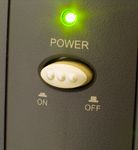Switch off and save energy
16th July 2012
UK homes are consuming much more electricity than previously estimated, a report has suggested.
The report, commissioned by DECC and the Energy Saving Trust, found that up to 16% of households' energy bills are spent on devices left on standby. It is estimated that domestic energy use accounts for more than a quarter of the nation's CO2 emissions. The UK year-long study involved more than 250 households and found that he modern home contained an average of 41 devices, compared with a dozen or so in the 1970s. Amazingly, the report found that single-person households – over 29 per cent of all UK households – use as much, and sometimes more, energy than typical families for cooking and laundry.
With a new intake of students due to start at the UK’s colleges and universities in September, this report shows the need for switch off campaigns in further and higher education. Students (and staff) arrive with phones and laptops, whilst those living in halls of residences will bring their home comforts with them – many of which require electricity. They all add to an institution’s energy bill, and to its carbon footprint.
So, how can the sector cut back on its energy consumption? We all know that we should switch off the lights when we leave the room and turn off our computers at the end of the day, but how many people actually remember to do it? Encouraging staff and students to switch off is important. Combining these small acts can make a big difference, and educating students and staff to switch off can help engage them in other bigger sustainability campaigns.
A wide range of information on reducing energy and ideas for switch off campaigns can be found on the EAUC's Resource Bank,
www.eauc.org.uk/resources.
To view the energy consumption report in full, please
click here.






 Except where otherwise stated, content on this site is
licensed under a Creative Commons Attribution 3.0 License.
Except where otherwise stated, content on this site is
licensed under a Creative Commons Attribution 3.0 License.
